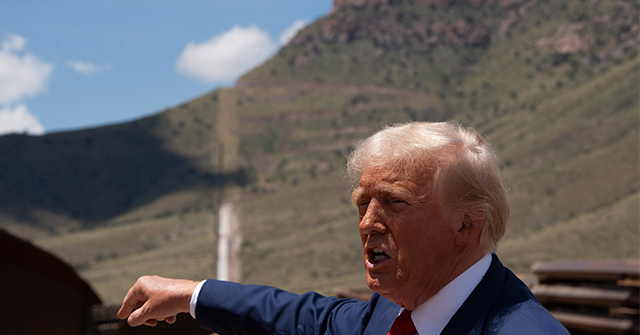Trump’s Tariff Diplomacy Puts Points on the Board
Donald Trump has once again proven himself a more nimble negotiator than his critics understand.
He announced plans to impose a 25 percent tariff on imports from Mexico and Canada unless both nations took meaningful steps to curb the flow of illegal migrants and fentanyl into the U.S. Last week, both Trump and White House Press Secretary Karoline Leavitt reinforced that this was no empty threat—dismissing the notion that Trump would hesitate to impose tariffs if Mexico and Canada refused to cooperate.
We have long argued that Trump’s willingness to act should never be underestimated. A 25 percent tariff on imports would impose some costs on U.S. businesses and consumers, but the economic hit to Mexico and Canada would be far greater. Retaliatory tariffs, should they try them, would hurt their own consumers even more.
What Trump demanded was hardly unreasonable. He wasn’t asking for economic self-sacrifice or the abandonment of national interests. He simply insisted that Mexico and Canada return to the successful policies they implemented during his first term—policies that collapsed under Biden, whose administration actively opposed serious border security efforts for reasons that still defy explanation. Why did Biden’s White House view securing America’s borders as a political threat rather than a national priority?
Donald Trump walks along the U.S.-Mexico border on August 22, 2024, south of Sierra Vista, Arizona. (Rebecca Noble/Getty Images)
When the February 1 deadline for action arrived, Trump followed through. The administration said it would impose:
- 25 percent tariffs on most Mexican and Canadian goods
- 10 percent tariffs on Canadian energy exports
- An additional 10 percent tariff on Chinese goods
The Pundits Root Against America
The globalist commentariat erupted in predictable outrage. They warned the tariffs would fuel inflation, push Mexico and Canada toward China, send fuel prices soaring, and cause produce shortages. The rhetoric felt eerily familiar—much like the media meltdown a week prior over Trump’s tariff threat on Colombia, where pundits fear-mongered about Valentine’s Day flower prices and coffee becoming unaffordable.
These complaints expose a deeper rot in elite thinking. If stopping human trafficking and fentanyl smuggling means paying more for avocados and cherry tomatoes, then the tradeoff isn’t worth it. If integrated auto supply chains require surrendering control of our border, then integration is too high a price to pay. The anti-tariff establishment unwittingly exposed the severe “negative externalities” of trade with Mexico and Canada—costs they never admit exist.
Over the weekend, the reaction from Beltway critics took an even uglier turn. They weren’t just predicting that Mexico and Canada would resist U.S. demands—they were rooting for resistance. They wanted Trump to fail. They hoped Mexico and Canada would retaliate, forcing Trump to back down. Their real fear isn’t that tariffs won’t work. Their fear is that they will—and that the Trumpian political paradigm is here to stay.
But Mexican President Claudia Sheinbaum had different priorities. On Monday, she struck a deal with Trump to pause the tariffs for a month in exchange for:
- Deploying 10,000 Mexican troops to secure the border
- Tighter cooperation on drug and weapons trafficking
- Further negotiations on border security and trade
“We had a good conversation with President Trump with great respect for our relationship and sovereignty; we reached a series of agreements: 1. Mexico will immediately reinforce the northern border with 10,000 members of the National Guard to prevent drug trafficking from Mexico to the United States, particularly fentanyl. 2. The United States is committed to working to prevent the trafficking of high-powered weapons to Mexico. 3. Our teams will begin working today on two fronts: security and trade,” Sheinbaum announced.
Trump said that in the coming month “we will have negotiations headed by Secretary of State Marco Rubio, Secretary of Treasury Scott Bessent, and Secretary of Commerce Howard Lutnick, and high-level Representatives of Mexico. I look forward to participating in those negotiations, with President Sheinbaum, as we attempt to achieve a ‘deal’ between our two Countries.”
In other words, Trump’s tariff diplomacy is working. Whether the tariffs remain on hold depends on how effectively Mexico follows through, but the early signs are promising.
Trump may win this trade war without ever firing a shot.
Read the full article here


